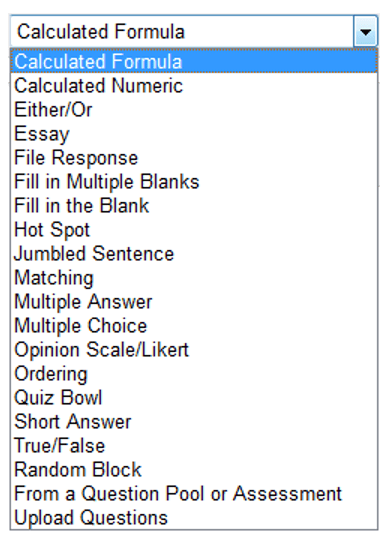Summative assessments are used to determine after a period of time what your student has learned. It summarizes the learning to that point. It is assessment of learning, as opposed to formative assessment, which is assessment for learning.
Most LMSs provide tools for developing online quizzes, tests, and exams.
The Illinois Online Network website provides the following testing strategies for online classes:
- Unless you plan to use a proctoring site, plan on the quiz being open notes.
- Use question data banks so that all students get a randomized quiz and can’t copy from one another.
- Use random numerical values when possible so that each students gets different numbers for numerical answers, even if the rest of the question is the same.
- Create questions in many formats so that multiple choice guessing is minimized.
- Insert at least one higher level thinking question in short answer or essay form.
- Embed quizzes within other exercises. A pop quiz during a synchronous session can keep students on their toes so to speak.
- Monitor IP addresses for quiz taking. If a student is always taking a quiz at one IP address but completing other course content from another IP address, there is a possible sign of cheating.
- Provide practice exams. In some cases, students can be provided with a bank of questions before the actual quiz to work through. They will then learn how to do every question, even though the actual quiz may only include a subset of those questions.
- Set specific time constraints in Blackboard for the quiz. This can make cheating coordination more difficult.
- Provide an honor code at the start of the course and make cheating policies clear in the syllabus.
- Allow the students to write quiz questions that are then given to the class. This can create student ownership over the process and increase motivation to perform the work.
- For more resources, do a Web search for “online” “quizzing” “academic” and/or “honesty” as examples to receive a number of helpful resources.
- Sample Test Questions Addressing Bloom’s Taxonomy, http://www.ion.uillinois.edu/resources/tutorials/assessment/bloomtest.asp
Assessments can be used to measure a student’s knowledge, skills, aptitudes or beliefs. A variety of formats are available, as shown below, with many providing automatic grade calculation:
A standard process is used whether building pools of questions, survey questions, or test questions. The large variety of question types can be applied in surveys, pre- and post-tests, weekly quizzes, practice tests, midterms, or final examinations. LMSs typically give you the ability to administer quizzes or tests 24/7 with safeguards such as random questions for each student, timed tests, password protection and adaptive release of quizzes. Proctoring services are available for a fee…though the efficacy and reliability might be questioned.
 As the Illinois Online Network material noted above, you do not have to limit yourself to only multiple-choice tests. Using a variety of formats addresses multiple learning styles, and using pools of questions with random blocks for tests mitigates against student collaboration on tests. If every student in your class had a different and unique test, the value of collaboration drops off, as does the value of any one student printing her or his test.
As the Illinois Online Network material noted above, you do not have to limit yourself to only multiple-choice tests. Using a variety of formats addresses multiple learning styles, and using pools of questions with random blocks for tests mitigates against student collaboration on tests. If every student in your class had a different and unique test, the value of collaboration drops off, as does the value of any one student printing her or his test.
